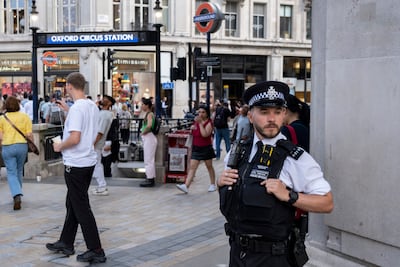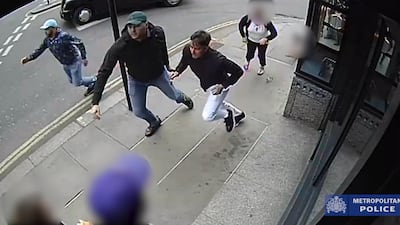Thefts during the daytime in the UK are hitting record highs as criminals become more brazen in the face of stretched police forces, official statistics show.
The Crime Survey for England and Wales, which is produced by the Office for National Statistics, shows that in five crime groups there was an increase in offending in the morning or afternoon.
Seven in 10 thefts from a person, which includes pickpocketing and bag snatching, took place in the daytime in the year to March 2023, the period covered by the most recent available figures. Affluent areas of central London are particular hotspots for theft.
Those figures equate to a 63 per cent increase on 2020, and a fifth of such thefts take place outside shops or supermarkets, double the rate from the previous period.
Daytime thefts of bicycles are now at 46 per cent, the highest figure, with the average cost of a stolen bike now just under £600, up from £348.
Attempted thefts of vehicles rose from 15 per cent in 2020 to 21 per cent in 2023, with the average cost of damage now £1,082, up from £357 in 2020.
James Alexander, a criminologist from London Metropolitan University, told The National the “reduction in neighbourhood policing has led to an increase in opportunist crime”.
“Policing cuts have mean that police have gone towards a more responsive approach so you’ll see the police when there’s a call made to them but they won’t be out and about reducing crime,” he said. “You’re not going to steal a bike when you know there’s a policeman around.”
The British Crime Survey questions 35,000 people about their experience of crime in the UK and is considered to be the most reliable indicator of long-term trends.
Arson attacks and other criminal damage carried out during the day has jumped from 32 per cent to 39 per cent, the data shows.
Brazen criminals
Daytime robbery has fallen from 51 per cent to 41 per cent, though the number of robberies taking place in the street has gone up to 37 per cent, an eight-point increase. London in particular has been experiencing an spate of violent robberies of luxury watches, including those carried out by an Algerian-led gang.
The data also shows burglars are also becoming more brazen, with seven out of 10 burglaries occurring when the victim is in their own home. Overall daytime burglaries have fallen, however, from a high of 43 per cent in 2018 to 32 per cent.

The average value of items stolen during a burglary went up to £4,373 in 2023 from £2,856 in 2020.
Dr Alexander explained that “with the downturn in the economy people are struggling, and people are inclined to take opportunities to make quick money”.
Police in the UK are also stretched by having to deal with mental health calls, for example to check on people who have missed an appointment or not taken medication.
“People know that if they do take an opportunity to commit a crime, the likelihood is that it is not going to be investigated and if it is investigated it is not going to be solved,” he said.
'Unsolved' crimes
Yvette Cooper, the opposition Labour Party’s shadow home secretary, slammed what she said was the Conservative government’s “abysmal record on law and order” with “more criminals being let off and more victims being let down”.
“The decimation of neighbourhood policing and a plummeting charge rate has left criminals feeling like they can operate with impunity.
“Under the Conservatives, 90 per cent of crimes go unsolved, fewer offenders are charged, and there are 10,000 fewer neighbourhood police and PCSOs [Police Community Support Officers] on our streets.

“So it is little wonder that criminals are becoming more brazen, with a record proportion of thefts happening during the day and more burglaries than ever before taking place while someone is at home.
"Labour will put 13,000 more neighbourhood police and PCSOs back on the beat in our communities and reverse the catastrophic collapse in the proportion of crimes being solved – rebuilding confidence in policing and the criminal justice system and restoring the rule of law on Britain's streets."
The Home Office pointed to caveats issued by the ONS regarding the testing of the statistics' significance to caution against relying too much on them,
“Since 2010 our communities are safer, with neighbourhood crimes such as burglary and robbery down 48 per cent,” said the department in a statement.
“We have delivered on our promise to recruit 20,000 additional police officers, which means there are now over 149,000 officers in England and Wales, higher than the previous peak before the police uplift.
“But we are clear that charge rates need to improve. We welcome the police’s commitment to attend the scene of every home burglary and expect them to take a zero-tolerance approach to all crimes by pursuing all reasonable lines of inquiry to bring more perpetrators to justice.”


